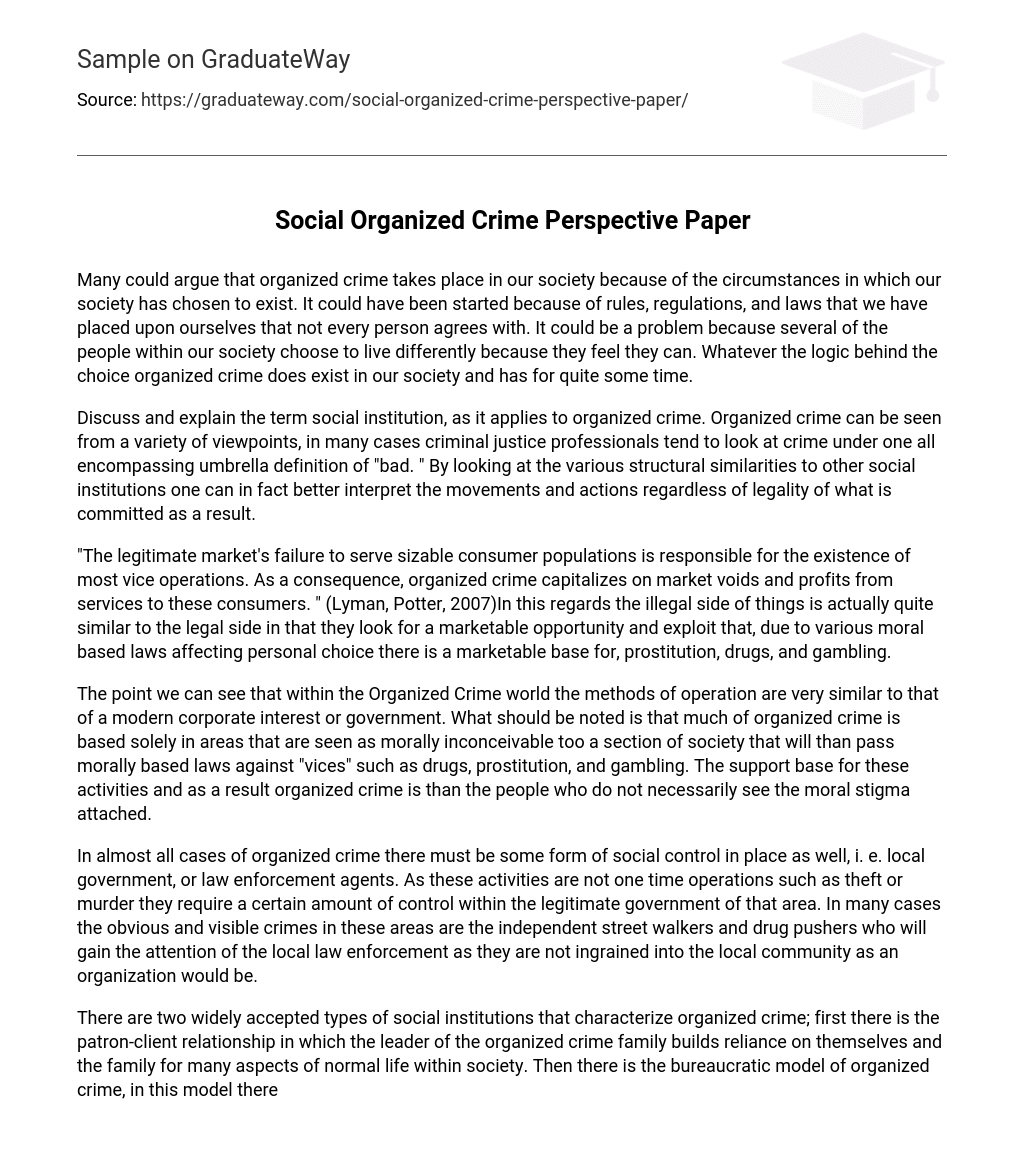Some argue that the existence of organized crime in society directly stems from the circumstances we choose to live under. This can be due to varying perspectives on rules, regulations, and laws or individuals following their own beliefs. Regardless of its origins, organized crime has persisted in our society for a considerable period.
In regards to organized crime, the term “social institution” is discussed and explained. It is acknowledged that organized crime can be perceived from different perspectives, often leading criminal justice professionals to categorize it as simply “bad.” However, by examining the comparable structural elements to other social institutions, a deeper understanding of the activities and intent behind organized crime can be achieved, irrespective of the legality of their actions.
“The existence of most vice operations stems from the failure of the legitimate market to cater to significant consumer populations. As a result, organized crime seizes opportunities in market gaps and earns profits by supplying services to these consumers.” (Lyman, Potter, 2007) In this regard, the illegal side mirrors the legal side by seeking lucrative opportunities and exploiting them. The presence of moral-based laws that restrict personal choices creates a market for activities such as prostitution, drugs, and gambling.
Within the world of Organized Crime, the tactics used are similar to those employed by modern corporate interests or governments. It is crucial to acknowledge that a significant portion of organized crime operates exclusively in morally unacceptable sectors, which face legislative action driven by moral considerations. This includes actions against activities like drugs, prostitution, and gambling. The support for these activities and for organized crime itself comes from individuals who do not necessarily perceive the moral stigma surrounding them.
Ordinarily, social control is required for organized crime and is usually implemented by local government or law enforcement agencies. Unlike isolated crimes like theft or murder, organized criminal activities require control from the legitimate regional government. In these areas, individual street prostitutes and drug dealers are often more noticeable in their criminal behavior and tend to attract the focus of local law enforcement. This is because they lack the strong community connections that organized crime groups possess.
The organized crime community recognizes two primary social institutions. The first one is the patron-client relationship, where the leader of the crime family establishes a dependence on themselves and their family for various aspects of daily life in society. The second institution is the bureaucratic model of organized crime, which operates with a well-defined structure and hierarchy. It employs individuals using both legal and illegal methods while distributing risk throughout the entire organization.
What are the most relevant empirical and speculative theories regarding organized crime and criminal behavior? There are multiple theories explaining the presence of organized crime, with some being mentioned here. An older theory called the “queer ladder of mobility” proposes that organized crime was a method to achieve goals, allowing individuals to amass wealth and obtain power.
One fascinating idea is the ethnic succession theory, which suggests that each new immigrant group faces barriers to achieving the “American Dream” and may resort to organized crime as a means of attaining it illegally. Similarly, the Alien Conspiracy theory points out that some authors believe the Sicilian Mafia brought their criminal culture to the United States during migration. Lastly, the Social Control Theory suggests that community, family, and societal bonds can either discourage or encourage involvement in criminal activities.
The text suggests that fear of punishment, shame, embarrassment, and psychological factors such as conscience can prevent individuals from engaging in criminal behavior. According to Freudian Theory, conscience, referred to as the “super ego,” plays a significant role in this restraint. In the author’s viewpoint, this theory is highly relatable to organized crime, as it often revolves around familial or societal ties and their perception of the surrounding society.





